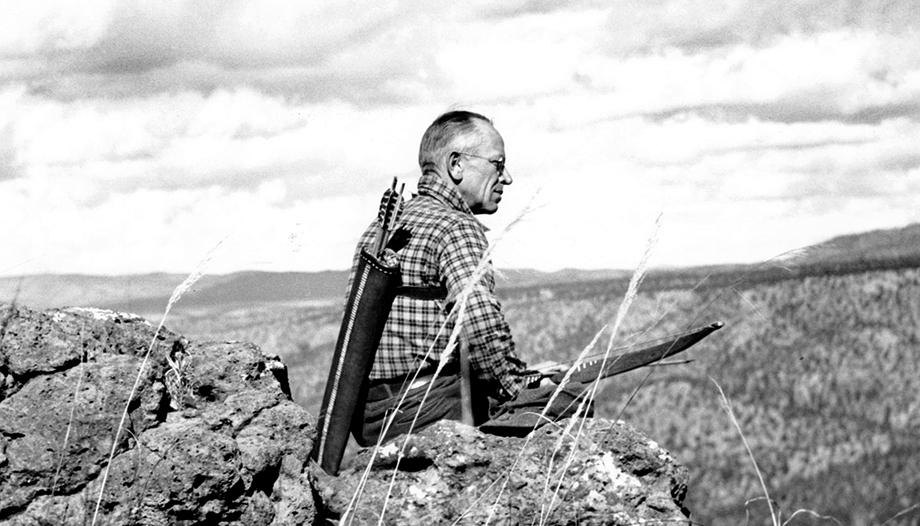The book One year in Sand County is the most emblematic work of Aldo Leopold (1887-1948), originally published in 1949. It brings together his impressions - poetic and philosophical - the fruit of his observation of every natural event and of a deeply contemplative and reflective life, focused on the relationship between the human being and the community he inhabits.
A work born of a passion
Why read Aldo Leopold today? At a time when we ask ourselves about the effects of our actions on the environment and we are confronted with answers that are confusing, pessimistic and sometimes detached from our nature, Aldo Leopold gives us a clue. By engaging us in his great passion, the outdoors, he helps us find the answers in a relationship, not in a confrontation. If we are part of a whole, the answer to the question of sustainability is an ethic, not a tactic. And it comes from life.
Leopold's reflections are always born out of his life. The first part of the book, entitled One year in Sand Countyis written in the form of a memoir and masterfully narrates the daily life in ".the Shack"("the shack"), the familiar name for the land in Wisconsin that Leopold bought in 1930, used as a vacation and weekend retreat. This first part is of great beauty. Any excuse - the tracks of a skunk in the snow, a log burning in the fireplace, the courtship of birds in April, the felling of a hundred-year-old oak tree killed by lightning - triggers meticulous narratives in which the protagonists are animals, trees, stars; and we become privileged observers of a story that grips like an epic narrative.
The descriptions are accompanied by reflections, flowing with irony, in no apparent order, on the relationship between humans and the earth, the concept of conservation, the artificial and the wild: "God gives it to us and God takes it from us, but that's not all he does. When some remote ancestor of ours invented the shovel, he became an offerer: he could plant a tree. And when he invented the axe, he became a subtractor: he could chop it down." (p. 134).
A life committed to the wild
Aldo Leopold is considered one of the most influential thinkers in the awakening of conservationism and environmentalism in the United States, both in the academic and intellectual world and among activists, and a precedent for the defense of sustainability. In Spain, however, he is still a little known figure. The publishing house Los Libros de la Catarata published in 2017 the book entitled A land ethic, which collects part of the essays published in One year in Sand Countywith an interesting introduction by Jorge Riechmann.
In 1930 Leopold acquired the abandoned farm that inspires his book. This land, known as "Sand County," represented the subject of his research. It was an area on the banks of the Wisconsin River devastated by fires, massive logging and over-farming, which had resulted in sandy meanders where Leopold and his family were planting oak and pine trees to restore the original landscape. It was on this same land that he died of a heart attack at the age of 61 while helping to extinguish a fire on a neighboring farm.
With the title Notes from here and thereThe second part gathers six essays that correspond to the places where Leopold lived or to which he traveled. From all these journeys emerge reflections of a life that was teaching him "gradually and sometimes painfully, that collective action is unstructured." (p. 14).
Among these episodes, one of the most important is that of Thinking like a mountainwhere he describes how the extermination of the wolves ended up destroying the vegetation in the mountains: "I've looked into the face of many a mountain that has just run out of wolves and watched the south-facing slopes crumple like a maze of new deer tracks. I have seen every edible shrub and sapling browsed, first to anemic neglect and then to death. (...) I now suspect that exactly as a herd of deer lives in terror of wolves, so too does a mountain live in terror of deer." (p. 226).
Community and love
In the third part is his famous essay Land ethics which can be considered his great intellectual legacy. To speak of land ethics is to speak of the ethics that expands the boundaries of the community to include soil, water, plants and animals, i.e.: the land (p. 334).
This new ethic is summed up in one of Leopold's most famous maxims: "Something is right when it tends to preserve the integrity, stability and beauty of the biotic community. It is wrong when it tends to the contrary." (p. 360). Here ethics and aesthetics touch. Just as in classical ethics the good is related to what things are, so beauty has to do with how we perceive things.
Finally, Leopold includes an element that admirably closes the circle of his reasoning: love. "For me it is inconceivable that an ethical relationship with the earth can exist without love, respect and admiration for it, and without a high regard for its values.". Eight years after the encyclical Laudato si Reading Aldo Leopold is a great way to go deeper into the care of our common home, as Pope Francis has asked us to do.









